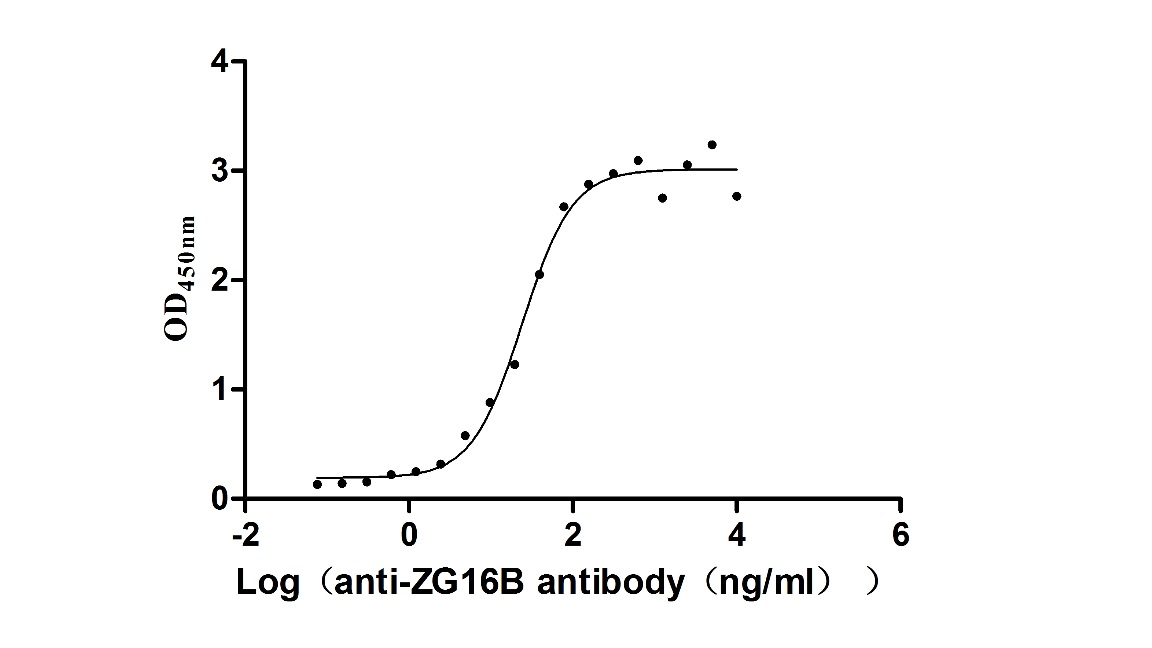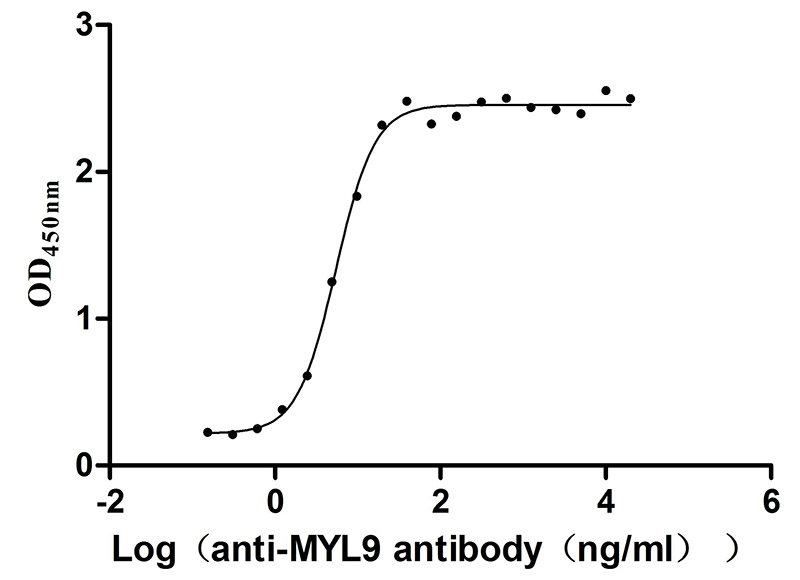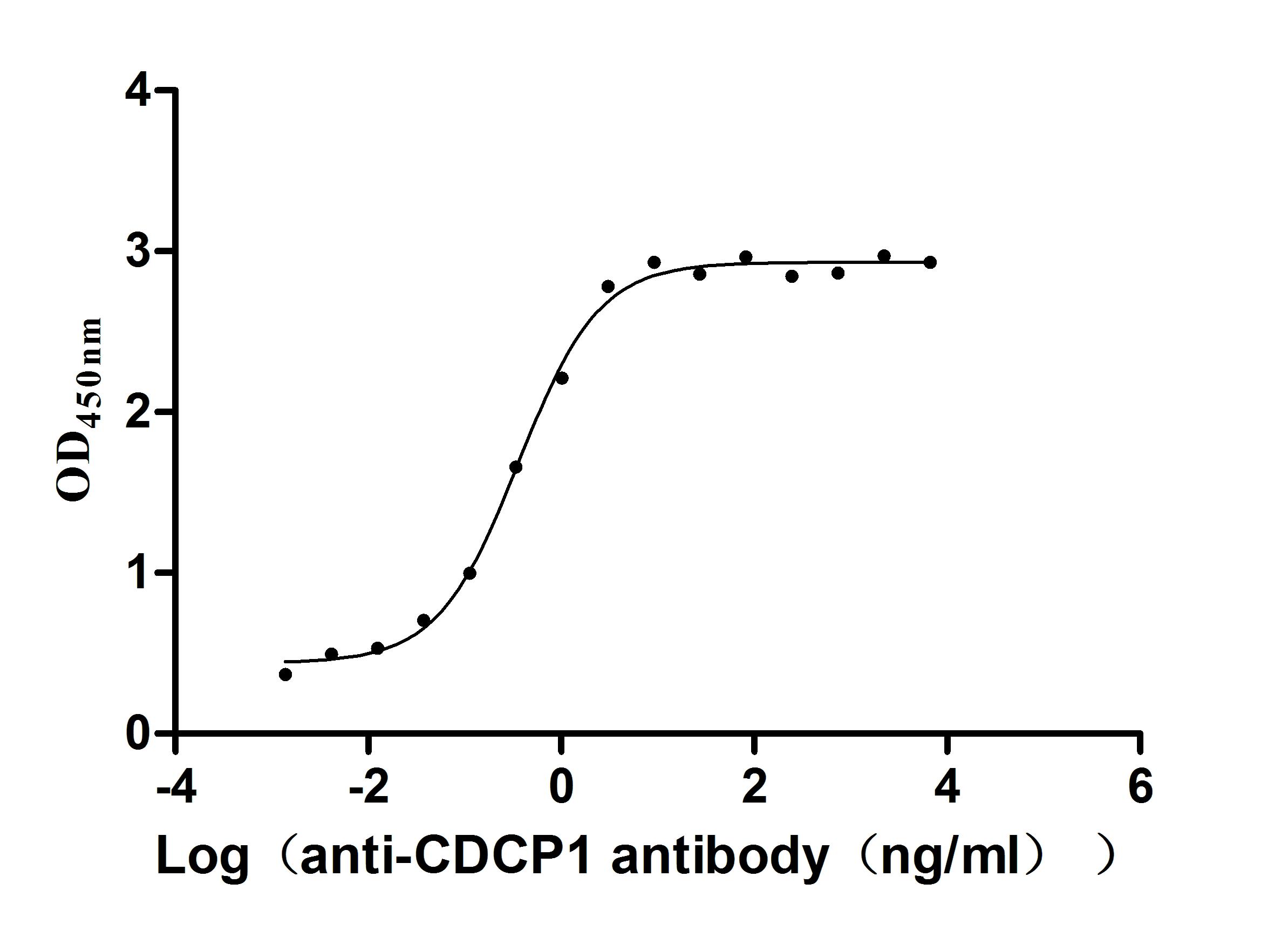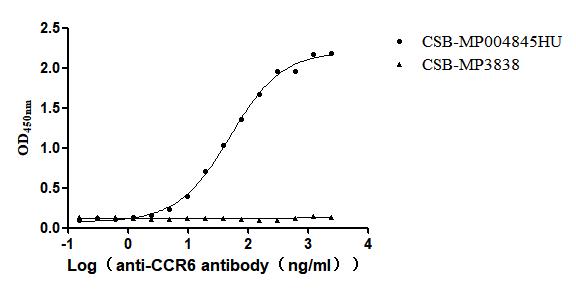Recombinant Human Growth hormone-releasing hormone receptor (GHRHR), partial
-
中文名稱:Recombinant Human Growth hormone-releasing hormone receptor (GHRHR), partial
-
貨號:CSB-EP009413HU1
-
規(guī)格:¥1536
-
圖片:
-
其他:
產品詳情
-
純度:Greater?than?85%?as?determined?by?SDS-PAGE.
-
生物活性:Not Test
-
基因名:
-
Uniprot No.:
-
種屬:Homo sapiens (Human)
-
蛋白長度:partial
-
來源:E.coli
-
分子量:46.8 kDa
-
表達區(qū)域:23-127aa
-
氨基酸序列HMHPECDFITQLREDESACLQAAEEMPNTTLGCPATWDGLLCWPTAGSGEWVTLPCPDFFSHFSSESGAVKRDCTITGWSEPFPPYPVACPVPLELLAEEESYFS
Note: The complete sequence may include tag sequence, target protein sequence, linker sequence and extra sequence that is translated with the protein sequence for the purpose(s) of secretion, stability, solubility, etc.
If the exact amino acid sequence of this recombinant protein is critical to your application, please explicitly request the full and complete sequence of this protein before ordering. -
蛋白標簽:N-terminal 10xHis-GST-tagged and C-terminal Myc-tagged
-
產品提供形式:Liquid or Lyophilized powder
Note: We will preferentially ship the format that we have in stock, however, if you have any special requirement for the format, please remark your requirement when placing the order, we will prepare according to your demand. -
緩沖液:If the delivery form is liquid, the default storage buffer is Tris/PBS-based buffer, 5%-50% glycerol. If the delivery form is lyophilized powder, the buffer before lyophilization is Tris/PBS-based buffer, 6% Trehalose, pH 8.0.
-
復溶:We recommend that this vial be briefly centrifuged prior to opening to bring the contents to the bottom. Please reconstitute protein in deionized sterile water to a concentration of 0.1-1.0 mg/mL.We recommend to add 5-50% of glycerol (final concentration) and aliquot for long-term storage at -20℃/-80℃. Our default final concentration of glycerol is 50%. Customers could use it as reference.
-
儲存條件:Store at -20°C/-80°C upon receipt, aliquoting is necessary for mutiple use. Avoid repeated freeze-thaw cycles.
-
保質期:The shelf life is related to many factors, storage state, buffer ingredients, storage temperature and the stability of the protein itself.
Generally, the shelf life of liquid form is 6 months at -20°C/-80°C. The shelf life of lyophilized form is 12 months at -20°C/-80°C. -
貨期:Basically, we can dispatch the products out in 3-7 working days after receiving your orders. Delivery time may differ from different purchasing way or location, please kindly consult your local distributors for specific delivery time.
-
注意事項:Repeated freezing and thawing is not recommended. Store working aliquots at 4℃ for up to one week.
-
Datasheet & COA:Please contact us to get it.
相關產品
靶點詳情
-
功能:Receptor for GRF, coupled to G proteins which activate adenylyl cyclase. Stimulates somatotroph cell growth, growth hormone gene transcription and growth hormone secretion.
-
基因功能參考文獻:
- Mutation in GHRHR is associated with pituitary diseases. PMID: 29277338
- Report GHRH-R labelling of apocrine glands and neoplastic epithelium in adnexal tumours and apocrine glands of the skin. PMID: 29895126
- Single nucleotide variant in GHRHR gene is associated with isolated growth hormone deficiency. PMID: 28910730
- GHRHR mutation is associated with growth hormone deficiency. PMID: 28525353
- The pP79L mutation is associated with the compromise in function, with the residual partial activity explaining the mild phenotype. PMID: 27501283
- This is the first report to demonstrate the GHRH-R codon 72 mutation in Sri Lankan patients with confirmed growth hormone deficiency. PMID: 27031974
- This study shows that GHRH-R is expressed by the majority of malignant mixed Mullerian tumors in both epithelial and mesenchymal components PMID: 26535981
- Identification of new missense mutations and an insertion mutation for the GHRHR gene in patients with isolated growth hormone deficiency. PMID: 25541890
- A reduced stature in older subjects heterozygous for the c.57+1G>A GHRHR mutation, indicating different effects of heterozygosis through lifespan. PMID: 25761575
- we found that pGHRH-R and its main splice variant are expressed in thyroid tissue and was upregulated in tumor cells compared to normal thyroid cells PMID: 25752763
- Indel mutation in the growth hormone releasing hormone receptor gene is associated with isolated growth hormone deficiency. PMID: 25153028
- These preliminary results suggest a greater than average GHRH-R expression in invasive lobular carcinomas and invasive ductal carcinomas associated with casting-type calcifications on the mammogram. PMID: 24479854
- Compound heterozygous mutations of the growth hormone-releasing hormone receptor gene is associated with isolated growth hormone deficiency PMID: 23602557
- Genu valgum was more prevalent in growth hormone deficiency GHRHR mutation patients than controls. PMID: 24057284
- We report a novel splice-disrupting mutation in GHRHR in 2 siblings and provide evidence that all c.57+1G>A (IVS1+1G>A) mutant chromosomes have the same haplotype ancestor PMID: 23052699
- The study established the GHRHR gene sequence variation map in isolated severe growth hormone deficiency patients and normal adult height. PMID: 22489751
- bone quality and metabolism and its correlation with insulin sensitivity in subjects heterozygous for a null mutation in GHRHR PMID: 21995288
- GHRH-R and Hsp90 were found to be independent predictive factors of histopathological response to neoadjuvant RCT. PMID: 22160161
- study describes a new frame shift mutation in the coding sequence of exon 4 (corresponding to the extracellular domain of the receptor)(c.391delG) in the GHRHR in a family with isolated GH deficiency PMID: 21816782
- This chapter reviews the biology of the GHRHR, the mutations that affect its gene and their effects in homozygous and heterozygous individuals. PMID: 20374725
- The homozygous GHRHR mutation was rare, being detected in only one Japanese isolated GH deficiency family. PMID: 21044116
- The endometriotic stromal cells (ESCs) and transformed human ESCs, but not normal endometrial tissues, expressed GHRH-R mRNA. PMID: 19524226
- These results show, for the first time, the activation of the MAPKs cascade by the splic variant (SV1) receptor. PMID: 19897610
- Longevity in untreated congenital growth hormone deficiency due to a homozygous mutation in the GHRH receptor gene. PMID: 19965916
- To ascertain whether (splice variant) SV1 mediates mitogenic effects on nonpituitary tissues, we expressed SV1 in 3T3 mouse fibroblasts and studied the properties of the transfected cells PMID: 11773624
- results demonstrate that mutations in the GHRHR are not limited to the coding sequence and that promoter mutations that impair Pit-1 binding can reduce expression of the GHRHR gene PMID: 11875102
- human GHRHR isoforms are found in experimental prostate neoplasms in mice; this could explain the effects of GHRH antagonists on growth of prostate cancer PMID: 12126741
- expression of mRNA and splice variants of this receptor in human malignant bone tumors PMID: 12220726
- an examination of the possible clinical significance of a polymorphism in the gene of this receptor: involvement in acromegaly PMID: 12220735
- mutations in the GHRH receptor gene make abnormalities of this gene one of the most common causes of of isolated growth hormone deficiency--REVIEW PMID: 12424433
- Compound heterozygotes for two previously undescribed mutations in the GHRHR that are predicted to cause complete lack of functional GHRHR protein: a nonsense mutation in codon 43 (Q43X), and a splice mutation at the beginning of intron 3 (IVS3+1G-->A). PMID: 12444890
- GHRH receptor may be associated with carcinogenesis PMID: 12867592
- autocrine stimulatory loop between GHRH and SV1 variant of GHRH receptor in primary cancers. PMID: 15362970
- GHRH-R was demonstrated in prostate and breast carcinomas, opening a variety of possibilities for the use of GHRH antagonists in the treatment of prostatic and mammary tumors. PMID: 15944917
- analysis of receptors for growth hormone-releasing hormone in human osteosarcomas and Ewing's sarcomas PMID: 16820890
- Heterozygosity for a null GHRHR mutation is not associated with reduction in adult stature or in serum IGF-I but is associated with changes in body composition and possibly an increase in insulin sensitivity PMID: 17356054
- Size of individual abdominal organs is influenced in different ways by severe and congenital lack of GH due to a GHRH-R mutation. PMID: 18034778
- the expression of GHRH and its tumoral receptor SV1 in primary human melanomas and dysplastic nevi by immunohistochemistry. None of the specimens tested expressed GHRH PMID: 18255167
- targeting the GHRH receptor may be a therapeutic option in Triple-negative breast cancers PMID: 18629632
- Gsp mutations up-regulate GHRHR mRNA expression in GH-secreting pituitary adenoma cells & desensitize the adenoma cells to GHRH in terms of their GHRHR mRNA expression. PMID: 19029774
- GHRHR might be one of the most important genes so far identified affecting normal variation in human height. PMID: 19209235
- Mutations in GH1 and GHRHR were identified in 41 patients from 21 pedigrees, representing 11.1% of our cohort with a higher prevalence of mutations in familial cases (38.6%) and in consanguineous pedigrees (75%) of congenital growth hormone deficiency. PMID: 19567534
- Common variants of the GNRH1 and GNRHR genes are not associated with risk of invasive breast cancer in Caucasians PMID: 19640273
- These results provide strong evidence that the splicing mutation IVS8+1G>A of growth hormone-releasing hormone receptor is a cause of pituitary dwarfism in the Chinese family. PMID: 19733620
顯示更多
收起更多
-
相關疾病:Growth hormone deficiency, isolated, 1B (IGHD1B)
-
亞細胞定位:Cell membrane; Multi-pass membrane protein.
-
蛋白家族:G-protein coupled receptor 2 family
-
組織特異性:Pituitary gland.
-
數(shù)據(jù)庫鏈接:
Most popular with customers
-
Recombinant Human Pro-neuregulin-1, membrane-bound isoform (NRG1), partial (Active)
Express system: Mammalian cell
Species: Homo sapiens (Human)
-
Recombinant Human Nectin-4 (NECTIN4), partial (Active)
Express system: Mammalian cell
Species: Homo sapiens (Human)
-
Express system: Mammalian cell
Species: Macaca fascicularis (Crab-eating macaque) (Cynomolgus monkey)
-
Recombinant Mouse Claudin-18.2 (Cldn18.2)-VLPs (Active)
Express system: Mammalian cell
Species: Mus musculus (Mouse)
-
Recombinant Macaca fascicularis zymogen granule protein 16 homolog B (ZG16B) (Active)
Express system: Mammalian cell
Species: Macaca fascicularis (Crab-eating macaque) (Cynomolgus monkey)
-
Recombinant Human Myosin regulatory light polypeptide 9 (MYL9) (Active)
Express system: Yeast
Species: Homo sapiens (Human)
-
Recombinant Human CUB domain-containing protein 1 (CDCP1), partial (Active)
Express system: Mammalian cell
Species: Homo sapiens (Human)
-
Recombinant Human C-C chemokine receptor type 6(CCR6)-VLPs (Active)
Express system: Mammalian cell
Species: Homo sapiens (Human)



-AC1.jpg)
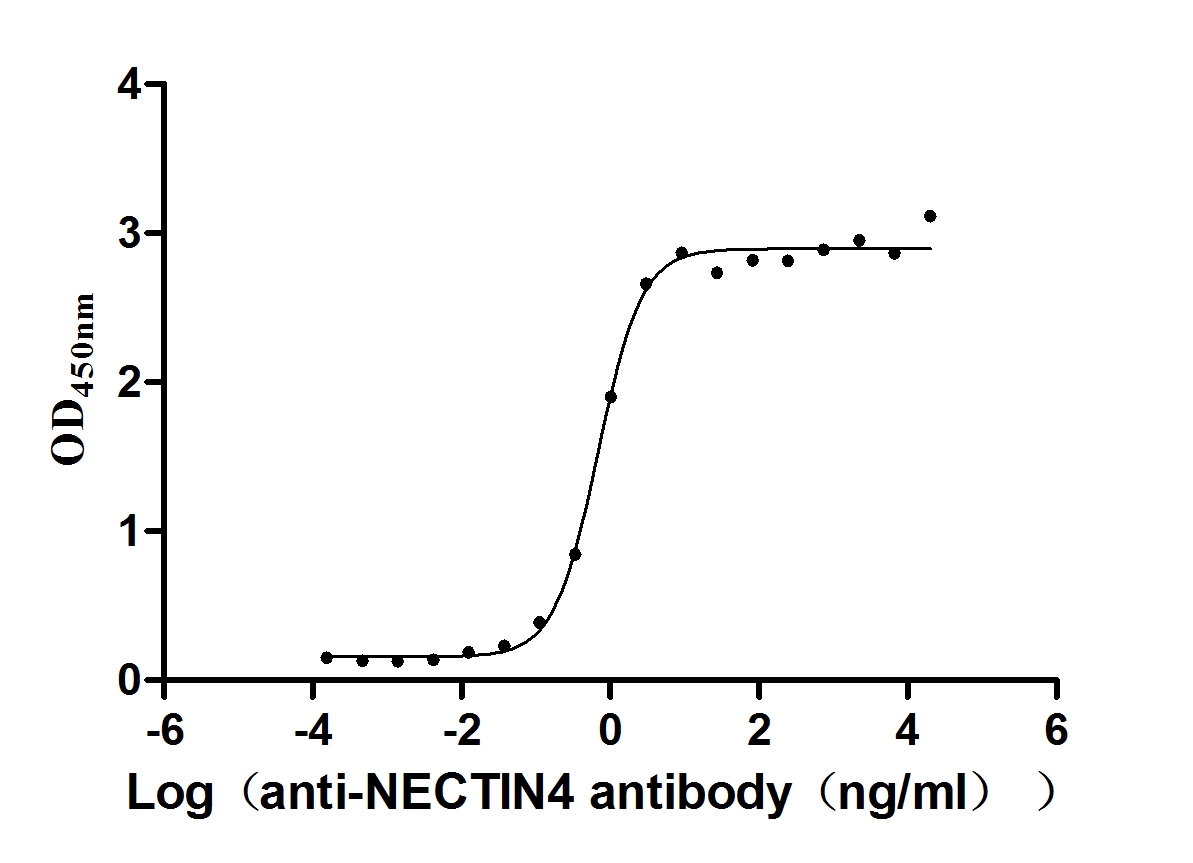
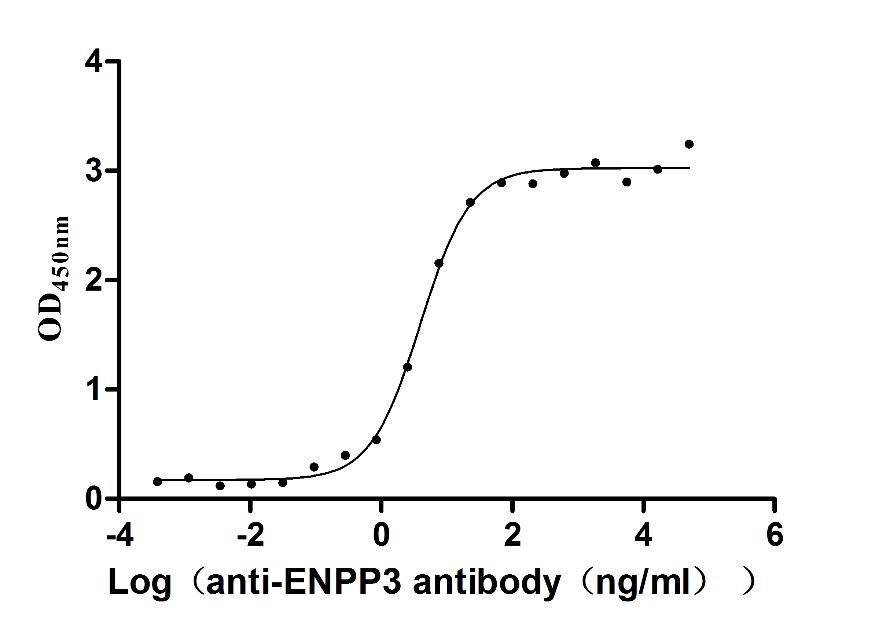
-AC1.jpg)
